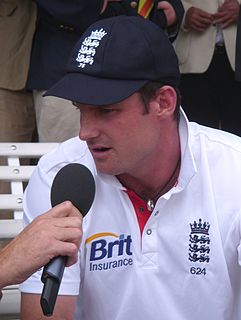Top 80 Quotes & Sayings by Andrew Strauss
Explore popular quotes and sayings by an English athlete Andrew Strauss.
Last updated on April 19, 2025.
I think there will be one overarching coach for Tests and one-day cricket. I think you need one person in control and in charge of that environment. Also it's important for people to know I am not going to be playing a tracksuited role. The execution of strategy is over to the captain and coach as it always has been.
I don't want to overplay the diary's significance, but it's a really helpful batting aid. It's not an obsession because I don't spend more than 10 or 20 minutes writing a day - and not necessarily every day. I might write in it three days in a row and then not the next four. It depends on the situation.






















